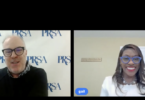Editor’s note: As we celebrate Public Relations Ethics Month this September, PRSA invited members of the Board of Ethics & Professional Standards (BEPS) to offer their views and thoughts on the ethical topics affecting the PR profession. Follow the blog series on PRSAY and join the national social media discussion by using the hashtag #PREthics. For a full list of Ethics Month activities visit the 2015 Ethics Month section of the PRSA site.
Stacy Smith found a great job with a PR firm after college graduation. At least she thought it was a great job. Long before she achieved seniority at the firm — and long before her college loans were paid — she lost that job because she refused to participate in unethical job-related activity. She stood firm in her convictions.
Suddenly, however, she was in crisis, searching for a new job. Her professional reputation took a hit. She was humbled at having to explain why she lost her first PR job. And she was depressed, struggling to pay her loans and the rent at the same time.
Joe Jones, PR director, discovered that his employer’s actions resulted in serious environmental damage despite the company president’s strong denial. He felt compelled to resign his position after every effort to provide ethical counsel, rather than continue to help communicate what turned out to be deceptive.
If you faced a career crisis like Stacy’s or Joe’s, would you be prepared? These fictional scenarios are compiled from real stories, comments and ideas from PRSA leaders and my own personal experience. Thank you to Debra Bethard-Caplick, MBA, APR; Kirk Hazlett, APR, Fellow PRSA; Marlene S. Neill, Ph. D, APR; and Robert R. Ulmer, Ph. D., for their input on this topic.
Here are some things I’ve learned.
Few of us have our own risk management plan. As members of PRSA, we take our Code of Ethics very seriously, but not many of us have thought about how to survive a personal crisis caused by someone else’s ethical misbehavior.
What can you do to be prepared for the risk of being ethical? Think ethics every day.
Before you accept a job offer or a new client
- Discover whether your prospective employer or client has an ethical disposition
- During discussion, before you accept, make the PRSA Code of Ethics part of your mutual understanding
During your career
- Prepare for potential loss
- Create a financial cushion
- Build a strong network and include someone who can be an ethical mentor and sounding board
- Build your personal brand as an ethical practitioner who is cool under fire — both within the company and the profession
In the daily course of business
- Use PRSA’s Ethics Month as a springboard for education and readiness: ethical workouts, ethical fire drills and review and update of your crisis plan
- As part of your company’s issues/crisis plan, advocate for including ethical failure along with cyber liability, fire and other challenges as practice scenarios
- Always scan the horizon, both for your organization and yourself
- Stay current and educated about ethics in general and within your industry
- Save examples from your industry as talking points for future conversations
Read everything you can from ethics leaders
You will be a stronger PR professional and be prepared for your own risk management. Here are some suggested resources for thinking ethics every day.
Effective Crisis Communications: Moving From Crisis to Opportunity by Robert R. Ulmer, Timothy L. Sellnow and Matthew W. Seeger
Article: Marlene S. Neill & Minette E. Drumwright (2012): PR Professionals as Organizational Conscience, Journal of Mass Media Ethics: Exploring Questions of Media Morality, 27:4, 220-234
Ethics Month activities and resources at PRSA.org: https://www.prsa.org/AboutPRSA/Ethics/EthicsMonth/index.html#.VfHgWu9RGck
The PRSAY blog, includes a number of ethics topics by BEPS members and other leaders
A last thought. I have been lucky facing career ethical challenges. As a young professional, I was asked by an executive’s assistant to make a call and tell a lie. I said no. The executive called me on the carpet – but I kept the job and enhanced my reputation as an honest employee. Years later at the same company we lost a client after I refused their proposed project on ethical objections. I was lucky because that same executive, who became the president, had learned to trust my judgment. Being active in PRSA helped me learn good judgment in PR matters.
And now I have had the privilege of serving on the Board of Ethics and Professional Standards. I’ve learned in depth from some of the best PR professionals in PRSA. I highly recommend that you participate actively in PRSA every year and follow its leaders, BEPS activities and your own chapter’s ethics officer as you grow your career success based on Ethics Every Day.
Bobbi Johnson Simmons, APR PR Director Arlington/Roe & Co., Member, PRSA Board
of Ethics and Professional Standards, Past President, PRSA Hoosier Chapter.







